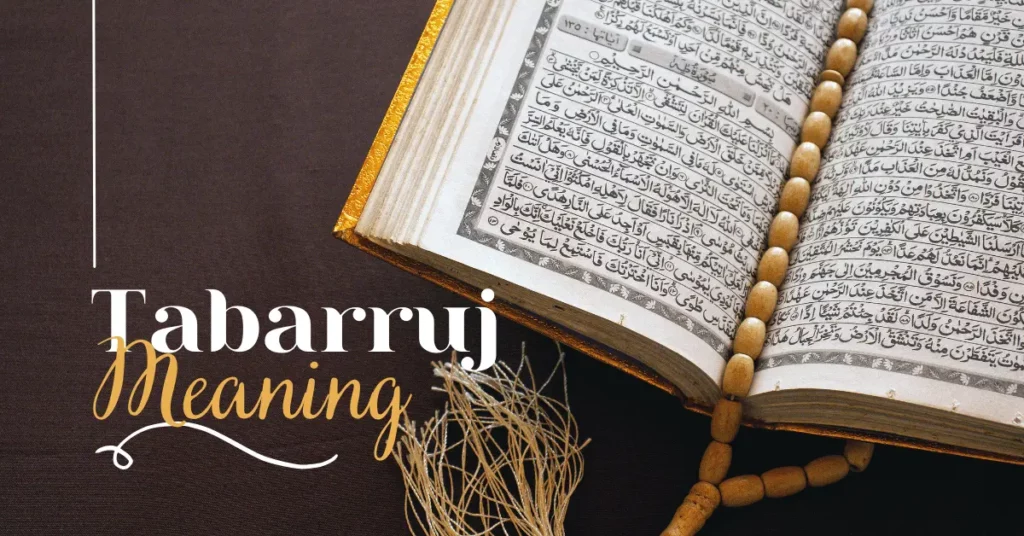Tabarruj is a significant concept in Islam that pertains to the modesty and decorum expected of Muslim women in their appearance and behavior in public. This concept is vital in Islamic teachings, crucial for the moral and social fabric of Muslim societies.
In this article, we will explore Tabarruj’s meaning in Islam, its significance, and how it affects the behavior and appearance of Muslim women in public settings. We will also discuss its implications for the overall moral and social values in Muslim societies.
Tabarruj Meaning in Islam
Tabarruj is a term derived from the Arabic root word “baraja,” which refers to the act of displaying one’s beauty or adornment in a conspicuous or immodest manner. In Islamic teachings, it is deemed inappropriate to display one’s physical beauty or adornment, especially in front of non-mahram (non-relative) men.
The Importance of Modesty in Islam
Modesty is a fundamental concept in Islam, encompassing both men and women. It reflects a sense of humility, self-respect, and a desire to protect one’s dignity.
The Quran and Hadith (sayings and actions of the Prophet Muhammad) emphasize the importance of modesty in a Muslim’s life. For instance, in Surah An-Nur (24:31), the Quran instructs Muslim women to lower their gaze and guard their modesty, not displaying their beauty except to those closely related to them.
Spiritual Dimension:
Modesty is regarded as a virtue in Islam, closely tied to one’s spiritual development. It reflects a sense of humility and submission to Allah (God). The Quran encourages believers to cultivate humility and modesty in their hearts, emphasizing that those who are humble before God will receive His favor and mercy.
- “And turn not your face away from men with pride, nor walk in insolence through the earth. Verily, Allah likes not any arrogant boaster.” (Quran, Surah Luqman, 31:18)
- “Indeed, Allah is with the modest and humble people.” (Quran, Surah Al-Hajj, 22:54)
Gender Relations:
Modesty plays a significant role in regulating gender relations in Islam. It is a means of preserving the sanctity of intimate relationships, as well as protecting the dignity of both men and women. Modesty encourages modest interaction between unrelated men and women, with guidelines aimed at reducing inappropriate familiarity and potential harm.
The Implications of Tabarruj in Islam
Dress Code and Modesty
Tabarruj is closely associated with the prescribed dress code for Muslim women. It underscores the importance of modesty in clothing, emphasizing that women should cover their bodies, except for their face and hands, when in public or in the presence of unrelated men. The purpose of this dress code is to prevent the inappropriate display of physical beauty and to maintain a sense of decorum and modesty.
Behavior and Conduct
Tabarruj extends beyond clothing to encompass a woman’s behavior and conduct. Furthermore, it encourages women to maintain a dignified and modest demeanor in public spaces.
This includes avoiding behaviors that may draw undue attention to themselves or exhibit immodesty in actions, speech, or gestures.
Adornment and Makeup
While Islam does not inherently forbid adorning oneself with jewelry, makeup, and perfumes, Tabarruj cautions against the excessive or ostentatious use of adornments. Islamic teachings emphasize the importance of using such embellishments within the bounds of modesty, avoiding extravagance, and showing off.
Interactions with Non-Mahram Men
Tabarruj carries implications for how Muslim women interact with non-mahram men. Additionally, it encourages women to exercise caution and prudence in their dealings with unrelated men.
This includes avoiding physical contact, maintaining an appropriate distance, and engaging in respectful and non-flirtatious conversations.
Guarding Against Objectification
One of the key implications of Tabarruj is protecting women from objectification. By promoting modesty in dress and behavior, it helps prevent the reduction of women to mere objects of desire. Instead, it encourages others to value women for their character, intellect, and contributions to society.
Preserving Marital and Family Harmony
Tabarruj has implications for marital and family relationships as well. Moreover, it encourages married women to maintain modesty even within the confines of their homes, as it helps preserve the sanctity of the marital relationship and prevents discord.

The Significance of Tabarruj in Islam
- Preservation of Modesty (Haya): Tabarruj is a manifestation of the broader Islamic concept of “haya,” which denotes modesty, humility, and a sense of shame before Allah. It underscores the importance of preserving one’s modesty in all aspects of life, serving as a reminder that modesty is a virtue highly cherished in Islam.
- Guarding Against Sin and Temptation: Tabarruj aims to prevent sin and temptation by minimizing the display of physical beauty to unrelated individuals. It acknowledges innate human tendencies and strives to create an environment that discourages illicit relationships and moral transgressions.
- Preservation of Dignity and Self-Respect: Embracing Tabarruj helps individuals, especially women, preserve their dignity and self-respect. By adhering to modesty in dress and behavior, they avoid objectification and maintain a sense of personal integrity, irrespective of their physical appearance.
- Respect for Marital Boundaries: Tabarruj contributes to respecting the boundaries of marital relationships. By practicing modesty, married individuals ensure that their interactions with non-spouse members of the opposite gender remain respectful. This, in turn, helps maintain harmony and fidelity in marriages.
- Promotion of Chastity and Purity: One of the core objectives of Tabarruj is to promote chastity and purity. It encourages individuals to maintain a sense of decorum and morality, reducing the likelihood of engaging in inappropriate or promiscuous behavior.
- Respect for Others: Tabarruj encourages individuals to consider the feelings and sensibilities of others. By not drawing undue attention to oneself through immodest dress or behavior, individuals show respect for the comfort and moral values of those around them.
- Alignment with Islamic Values: Practicing Tabarruj is an embodiment of Islamic values and ethics. It reflects a commitment to living in accordance with the teachings of the Quran and Hadith, ultimately drawing individuals closer to Allah and promoting spiritual growth.
Conclusion
Tabarruj is an essential concept in Islam that underscores the significance of modesty and decorum in the appearance and behavior of Muslim women. It aligns with the broader Islamic principles of humility, self-respect, and maintaining one’s dignity.
Adhering to Tabarruj, Muslim women can nurture spirituality, uphold dignity, and contribute to their families and society. It is a concept deeply rooted in Islamic values and ethics, promoting a balanced and respectful way of life.
FAQS
A person who tolerates or is indifferent to the immoral behavior of female family members or a spouse.
The Prophet Mohammad (PBUH) declared: “Any woman who removes her clothing outside of her husband’s home (to flaunt for an unlawful purpose), has broken the shield between her and Allah.”
A Woman displaying one’s physical beauty or adornment, especially in front of non-mahram (non-relative) men.


